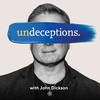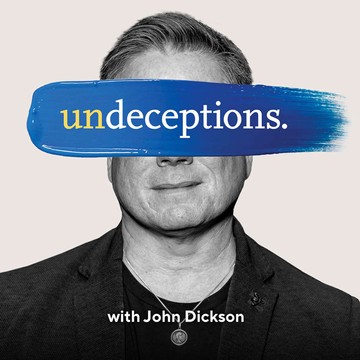

Undeceptions with John Dickson
Undeceptions Ltd
Every week on Undeceptions we’ll explore some aspect of life, faith, history, culture, or ethics that is either much misunderstood or mostly forgotten. With the help of people who know what they’re talking about, we’ll be trying to ‘undeceive ourselves’ and let the truth ‘out’.
Episodes
Mentioned books

Jan 23, 2022 • 12min
Knights of Christ
John Dickson's Bullies and Saints is a super-podcast providing excerpts of the book by the same name - a no-holds-barred look at the best and worst of church history.In this edition, John Dickson introduces us to two characters that display all that’s been good and bad about the followers of Jesus - Ebolus the crossbowman and Bernard of Clairvaux.Click here to buy a copy of Bullies and Saints, or here to own the entire audiobook.And for even more on the history of Christianity, and how well the church is mirroring the message that Jesus handed on, head over to the Undeceptions website.

Jan 16, 2022 • 15min
Christian Jihad
John Dickson's Bullies and Saints is a super-podcast providing excerpts of the book by the same name - a no-holds-barred look at the best and worst of church history.In this edition, John investigates the accusation that Christianity is a faith that was propagated by the sword rather than peace. Are Christians guilty of their own jihad?Click here to buy a copy of Bullies and Saints, or here to own the entire audiobook.And for even more on the history of Christianity, and how well the church is mirroring the message that Jesus handed on, head over to the Undeceptions website.

Jan 9, 2022 • 14min
The Birth of Charity
John Dickson's Bullies and Saints is a super-podcast providing excerpts of the book by the same name - a no-holds-barred look at the best and worst of church history.In this episode, John Dickson gives us an insight into the invention of charity, and just how revolutionary the Christian call to love one another proved for the ancient world.Click here to buy a copy of Bullies and Saints, or here to own the entire audiobook.And for even more on the history of Christianity, and how well the church is mirroring the message that Jesus handed on, head over to the Undeceptions website.

Jan 2, 2022 • 13min
Good Losers
John Dickson's Bullies and Saints is a super-podcast providing excerpts of the book by the same name - a no-holds-barred look at the best and worst of church history.In this edition, John uncovers the character of the earliest Christians, how it contrasted with the world around them, and how ‘in tune’ it was with the beautiful melody that Jesus set them to sing.Click here to buy a copy of Bullies and Saints, or here to own the entire audiobook.And for even more on the history of Christianity, and how well the church is mirroring the message that Jesus handed on, head over to the Undeceptions website.

Dec 26, 2021 • 14min
Peter The Hermit
John Dickson's Bullies and Saints is a super-podcast providing excerpts of the book by the same name - a no-holds-barred look at the best and worst of church history.In this episode, John Dickson takes us to the Crusades and introduces one of the most infamous crusaders of all: Peter the Hermit, a fire and brimstone Christian if ever there was one.Click here to buy a copy of Bullies and Saints, or here to own the entire audiobook.And for even more on the history of Christianity, and how well the church is mirroring the message that Jesus handed on, head over to the Undeceptions website.

5 snips
Dec 19, 2021 • 1h 2min
60. Resting Well
This episode was sponsored by Zondervan’s new book Ethics Beyond Rules, by Keith D Stanglin. Visit the undeceptions.com for more content, including the full show notes for this episode.Follow the show on Twitter and InstagramEmail the show with your comments / feedback: admin@undeceptions.comUndeceptions is the flagship podcast of Undeceptions.com: Letting the truth out.Theme music: JS Bach's Cello Suites, Prelude, performed by the Undeceptions Band. Hosted by John DicksonProduced by Kaley Payne Directed by Mark Hadley Audio Editing by Richard HamwiCopyright Undeceptions Ltd 2021

Dec 12, 2021 • 1h 7min
59. The Refugee
This episode was sponsored by Zondervan’s new book ‘Confronting Injustice without Compromising Truth’ by Thaddeus J Williams.Visit undeceptions.com for more content, including the full show notes for this episode.Follow the show on Twitter and InstagramEmail the show with your comments / feedback: admin@undeceptions.comUndeceptions is the flagship podcast of Undeceptions.com: Letting the truth out.Theme music: JS Bach's Cello Suites, Prelude, performed by the Undeceptions Band. Hosted by John DicksonProduced by Kaley Payne Directed by Mark Hadley Audio Editing by Richard HamwiCopyright Undeceptions Ltd 2021

Dec 8, 2021 • 22min
Christmas Star single
Dr. Chris Forbes brings his expertise in the Greco-Roman world to bear on why historians believe the story of the three magi and the star over a stable might actually be based in fact.Join John Dickson as these two historical boffins discuss astrological formations, ancient king-makers and a reasonable explanation for an interstellar night light in Bethlehem.

Dec 5, 2021 • 1h 7min
58. Question Answer V
This episode was sponsored by Zondervan's new book Urban Apologetics by Eric Mason. Visit the undeceptions.com for more content, including the full show notes for this episode.Follow the show on Twitter and InstagramEmail the show with your comments / feedback: admin@undeceptions.comUndeceptions is the flagship podcast of Undeceptions.com: Letting the truth out.Theme music: JS Bach's Cello Suites, Prelude, performed by the Undeceptions Band. Hosted by John DicksonProduced by Kaley Payne Directed by Mark Hadley Audio Editing by Richard HamwiCopyright Undeceptions Ltd 2021

Nov 28, 2021 • 1h 1min
57. Jesus Philosopher
The cliche is: ‘faith’ is the antithesis of knowledge … of wisdom. And therefore “Christian philosophy” is an oxymoron, right?Our guests today, though are professional philosophers and they reckon that, while Christians could do with a healthy dose of philosophy, so could sceptics. We all need to think deeply about what we believe, and why we believe it.And if you think – as atheists like Sam Harris and many others do – that scepticism or atheism doesn’t involve any mere ‘beliefs’, well, you probably especially need to think this stuff through. This episode is sponsored by Zondervan’s 10th Anniversary edition of Seven Days that Divide the World by John Lennox.For the full show notes, go to undeceptions.com.


